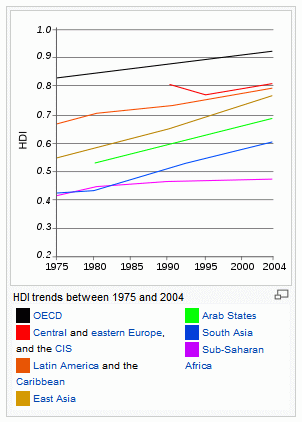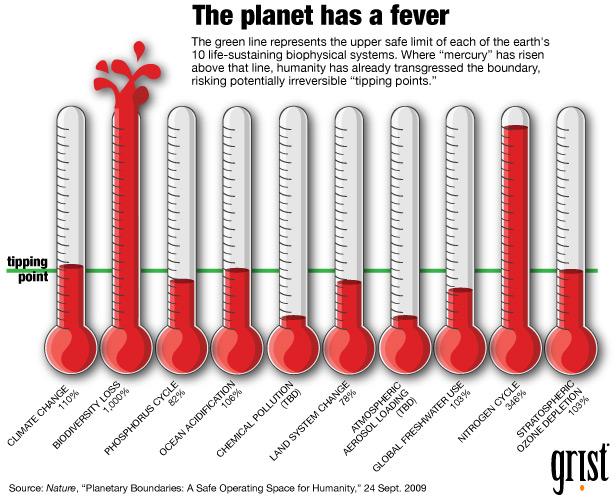 Human Development IndexBrad Plumer has a great post on why humanity seems to be doing relatively well even though the environment is falling apart. The same subject’s been on my mind since I read a piece by Foreign Policy editor Charles Kenny a few days ago called “Best. Decade. Ever.“
Human Development IndexBrad Plumer has a great post on why humanity seems to be doing relatively well even though the environment is falling apart. The same subject’s been on my mind since I read a piece by Foreign Policy editor Charles Kenny a few days ago called “Best. Decade. Ever.“
His argument is pretty simple: More people have more money, better health, more mobility, more food, and more security than ever before in human history. That chart on the right is from the Human Development Index, which tracks life expectancy, literacy, and other indicators of human well-being. The lines are heading up almost everywhere. Humanity doesn’t seem to be suffering unduly for its environmental sins.
The natural world, however, is going to sh*t. Species are dying off, the oceans are acidifying, forests are getting eaten by pine beetles, ice is melting, and plains are becoming deserts. Remember the study in Nature about “planetary boundaries” and how we’ve crossed a bunch of them?

So what explains the disparity? Why are people doing better even as ecosystems are doing worse?
That’s the subject of a new paper in Bioscience called “Untangling the Environmentalist’s Paradox: Why Is Human Well-being Increasing as Ecosystem Services Degrade?” Brad lists the researchers’ four possible answers:
- Maybe humanity isn’t really better off.
- Advances in food production are more important than anything else.
- Technology makes us less dependent on ecosystem services.
- The worst effects of ecosystem degradation are still yet to come.
The reasonable conservative take on this (population: Jim Manzi) is that Nos. 2 and 3 are true, and that even if 4 is true, the wisest course is to get richer, not spend money trying to reduce greenhouse-gas emissions. Getting richer makes us more able to adapt to whatever nature brings our way. And we can get richer in perpetuity — it’s what virtually all mainstream economic models show.
The problem is that No. 3 is better stated like this:
- Cheap and abundant fossil fuels have made us less dependent on ecosystem services.
The ability of humanity to grow and adapt, while extraordinary, is ultimately bounded by the amount of available, accessible energy. There is in fact a physical planet with finite resources. Merrily getting richer and assuming we’ll always be able to adapt to changes in global climate is to place unlimited faith in human ingenuity to overcome resource constraints. It is to imbue it with a kind of mystical significance.
If events like Russian fires, Pakistani floods, British Columbian pine-beetle infestations, Australian droughts, and Gulf hurricanes à la Katrina become steadily more common and severe, we’re likely to discover that it’s difficult to just up and redo a century’s worth of built infrastructure. For one thing, it takes an enormous amount of energy to retrofit and climate-proof our buildings, bridges, airports, sewage systems, and the rest. Yet there’s good reason to think that oil supply has or will soon peak and that coal may not be far behind. What will fuel our wholesale reindustrialization?
Mainstream economics views the last century’s growth of human population, power, and reach as the new normal — the default state of affairs. It is from that limited perspective that there is an “environmentalist’s paradox.” The world is degrading but we’re getting richer! From another perspective, however, we’re Wile E. Coyote riding that Acme rocket out over the canyon. What do you mean he’s in danger? He’s still going up!
The sociopolitical problem is that environmentalists (to use the term very broadly) have been arguing that we’re bumping up against limits for 50 years now, but human welfare just keeps spreading. Conservatives think this is a foolproof riposte against any talk of resource limits. I obviously disagree, but it is something greens need to grapple with.
There’s no contradiction in noting that coal is both bringing people out of poverty in China and insuring the suffering of future Chinese. Today the net welfare gains of coal use in China seem greater than the net losses, but that’s only because the gains are immediate and the losses are deferred for a while. In our lifetimes, that will change — the losses will come due. The dangers of responding too late to that inevitability are far, far worse than the dangers of acting too early.
The environmentalist’s paradox is a function of our parochial perspective. We’re just not accustomed to grappling with problems of global scope, decadal time lags, and irreversible impact.




